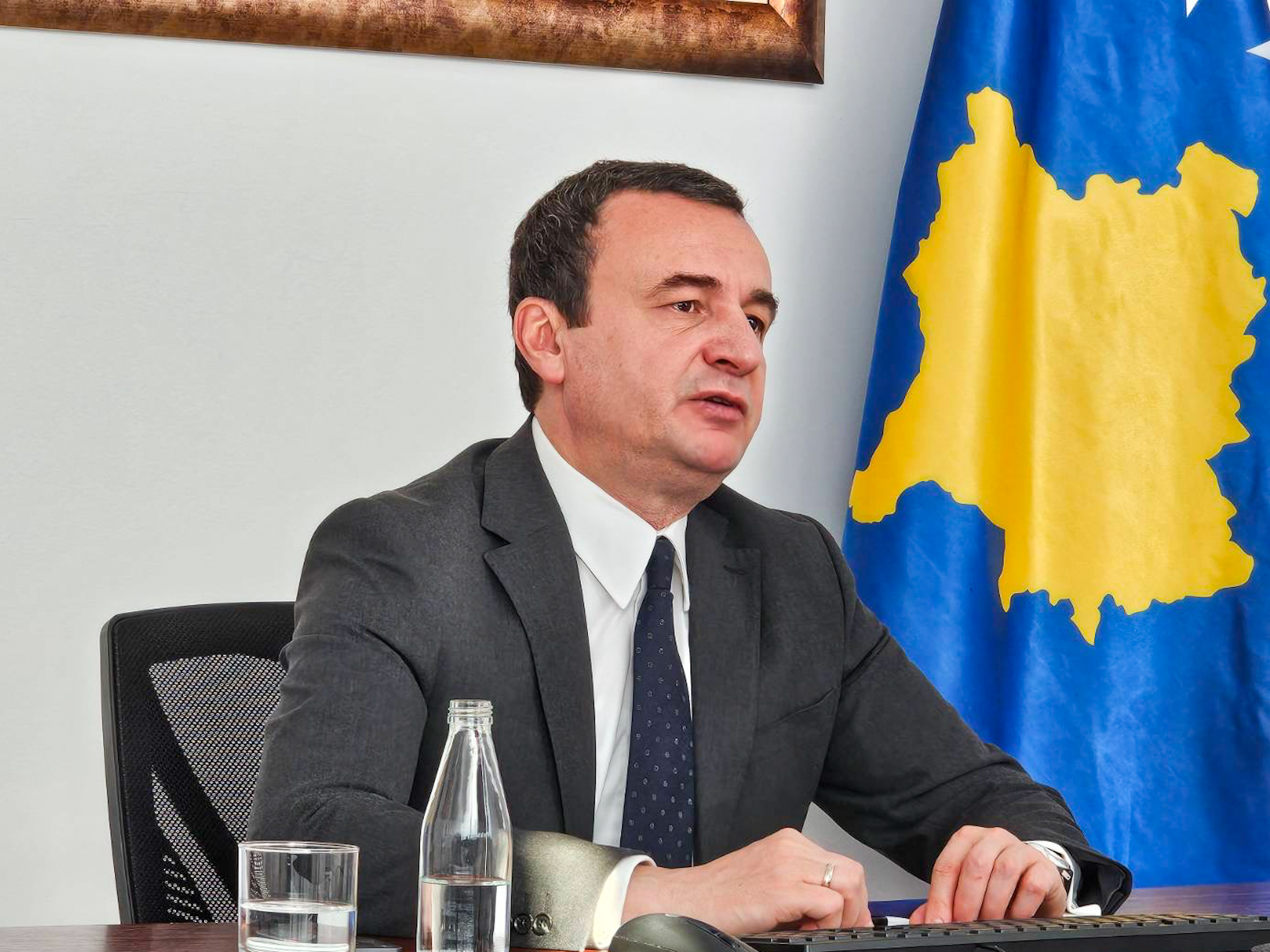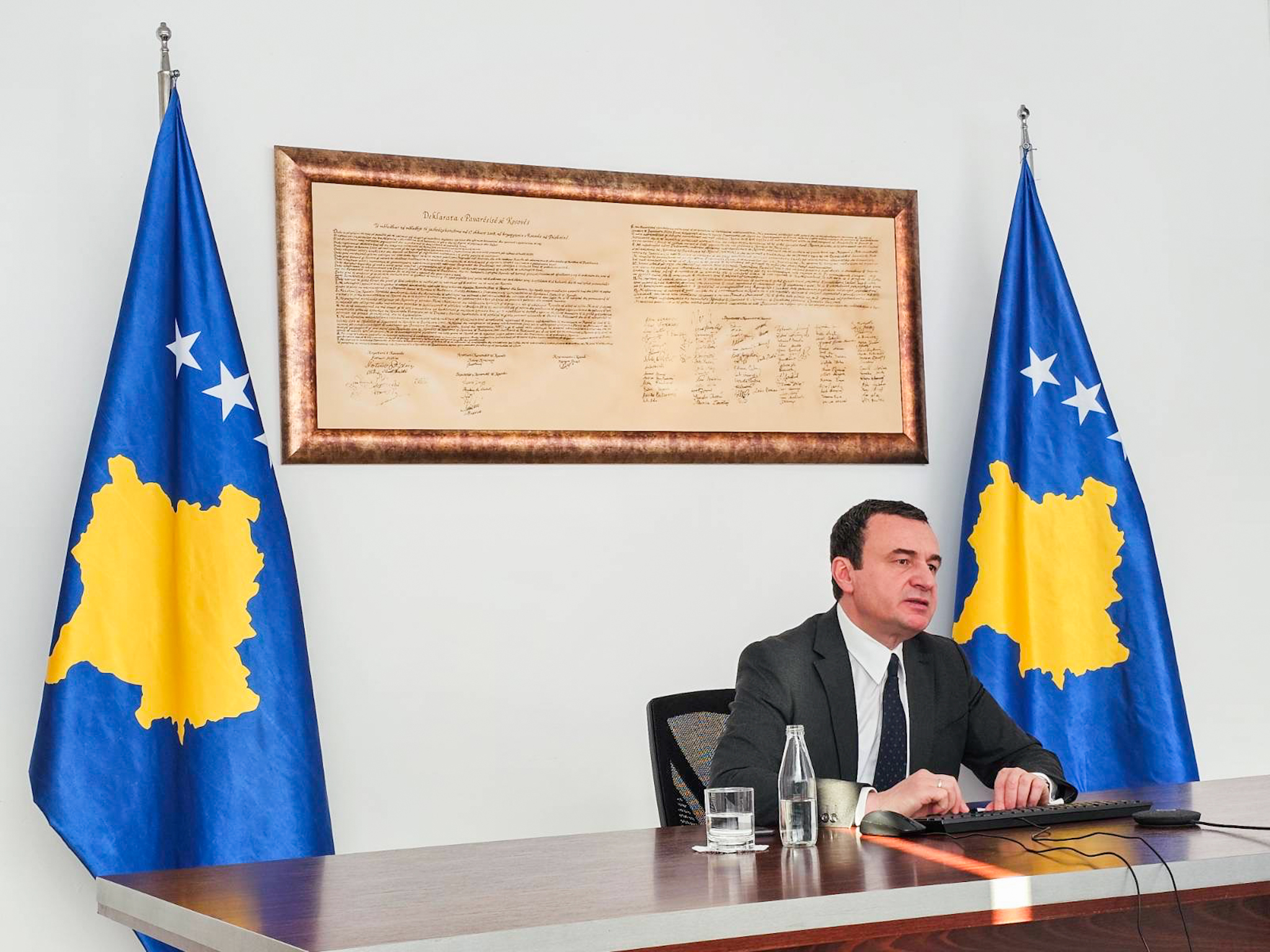Prishtina, 14 April, 2024
The Prime Minister of the Republic of Kosovo, Albin Kurti, participated virtually in the Oxford Leadership Conference, which is taking place in Dubai.
In his speech, he addressed the challenges we face together at the global level, such as energy and climate change, our approach to them and the work and achievements of the government.
“In Kosovo, we as a social democratic government believe in a vision for politics that is more inclusive – one that prioritizes humility and solidarity, nurtures sustainability and values the dignity of work. Our government is focused on addressing socio-economic inequalities by investing in growth and development. Our comprehensive policy package ensures that vulnerable groups, including low-income and marginalized groups, achieve significant improvements in well-being, access to employment, education and health, energy and services. According to the World Bank, Kosovo has offered the most generous aid package in the Western Balkans as a percentage of GDP to help citizens cope with inflation.” said the prime minister.
He emphasized, among many others, the increase in employment, the doubling of foreign direct investments and exports, child allowances and support for expectant mothers, the dual system, free higher education, support and scholarships for women in STEM, but also mentioned the high rankings positive of our country in various international indexes and rankings.
In conclusion, the Prime Minister said that “The events of the last three years, at home and abroad, remind us that equality, human rights and democracy cannot be taken for granted. They must be nurtured, protected and advanced with every condition, and we are proud to be uniquely positioned to appreciate and promote these values.”
Prime Minister Kurti’s complete speech:
Good morning dear participants of the 2024 Oxford Leadership Conference,
Greetings to all the academics, scholars and policymakers from the University of Oxford and beyond. It is my pleasure to join you on the final day of your gathering as future global leaders.
As one of Oxford’s most prominent former students, John Locke, theorised on resources, there must be “enough and as good” left to younger generations. Unfortunately, with concerns of inequality, security, and climate change, it is clear that this proviso of the social contract has been violated. Much of what has worked for past generations may need to be retired or reshaped to best serve a generation facing new challenges. Science and technology have paradoxically been the cause and solution to many global crises disrupting young people’s outlook on life and the future. But science and technology offer us only the facts, not the values, on which to act. It’s incumbent on us as governments — and on you, as future leaders — to take effective, value-based action.
In Kosova, we as a social democratic government, believe in a vision for policy that is more inclusive — a vision that makes humility and solidarity a priority, nurtures sustainability, and values the dignity of work. Our Government has focused on addressing socioeconomic inequalities while investing in growth and development. Our comprehensive package of policies ensures that vulnerable groups, including low-income and marginalised groups, attain significant improvements in well-being, access to employment, education and health, energy and other public services. According to the World Bank, Kosova has offered the most generous aid package in the Western Balkans as a percentage of GDP to help citizens cope with inflation.
Employment is higher than it has ever been, and we have twice as many young people employed in the labour market than when we took office. FDI and exports have doubled in the last three years, while our trade deficit has shrunk by a third. We have stayed true to our promise to new mothers and children under the age of 16, who are now beneficiaries of state monthly allowances. We kept our word to students when we said public higher education would be made free. Meanwhile, we are in the process of building a system of dual education in relation to the labour market, with 12 new programmes in 21 professional schools across Kosova, bridging the skills gap in our country.
On science and technology, our government has provided scholarships for more than 4,600 girls studying in STEM fields, a strategic initiative aimed at reshaping the technological landscape of the country. Today, more than 50% of students enrolled in Computer Science, Computer Engineering, and ICT in Kosova are girls, marking a significant shift towards gender equality in these fields. We are proud that Kosova already has 100% coverage of residential areas with broadband internet, which places us among the top 8 countries in Europe. From public administration and education to health and economy, we believe that digital transformation is a key driver towards a more transparent and efficient government. 155 electronic services have been launched in our government service portal, e-Kosova, which eliminates waiting times at counters and makes life easier for our citizens.
We recently joined the European Youth Card Association, which gives our young people access to discounts and benefits all over Europe, and we will be the first fully digital member country in this international organisation.
With digitalisation and technological advancements come concerns about security, which is why we have adopted a Cyber Security Strategy and a law on cyber security. That is also why we have established a Cyber Security Agency and a Training Center in the Kosova Security Force.
We believe in regional and Euro-Atlantic cooperation. Unfortunately, we are facing absurd obstacles rooted in historical grievances and autocratic tendencies. According to all international measures and indices, Kosova is the most advanced democracy in the region and has the most advanced constitution in Europe for the protection of non-majority communities. The 2024 report by the Swedish-based V-Dem Institute measuring democracy placed Kosova in first place in the Western Balkans and highlighted it as one of the few democracies showing improvement globally. These past few years, we improved 21 places in Transparency International’s Corruption Perception Index and 22 places in Reporters Without Borders’ Media Freedom Index.
Our ability to move forward is actively hindered by Serbia, which is not interested in being part of NATO or the EU. Its alliance with Russia and its fantasies of an alternate past are keeping us and the entire region behind. In my first two years as Prime Minister, Serbia amassed its army along the border with Kosova four times and sponsored terrorism within our borders. Last September, one Kosovar policeman was killed after an incursion of paramilitary terrorists. Over 5 million euros worth of arms and military-grade equipment were seized. Around 90 NATO soldiers last May were injured, some severely injured, due to attacks by a Belgrade-sponsored mob. Despite it all, we have entered into an agreement with Serbia under the auspices of the EU-facilitated dialogue — an agreement that Serbia now refuses to sign.
Another matter of national security we consider to be energy and climate change. In Kosova, we face many challenges in this regard, including dangerously high air pollution and a high risk of fires and floods. It will take a lot of resources for us to transition to clean energy and adapt our infrastructure to climate change. But today, the concept of sustainability is at the center of all policies, strategies, and laws that we draft and approve. Through investments, we are turning the Kosova Energy Corporation into the cleanest enterprise by installing 100 megawatts of solar energy. We are reforming our energy sector with the largest grant in the history of our country from the Millenium Challenge Corporation, worth 236.7 million dollars, and we are building the first project in the Balkans for central heating with solar energy, worth 80 million euros. I hope I have given you some food for thought as you finalise today’s programme.
It is clear to us that the ongoing war in Ukraine is not happening in a vacuum. A wave of autocrats around the world is actively seeking to subvert democracy and undermine hard-won human rights. Events of the past three years, at home and abroad, remind us that equality, human rights, and democracy cannot be taken for granted. They must be nurtured, defended, and advanced at all costs, and we are proud to be uniquely positioned to appreciate and promote this sentiment.
Thank you.
Last modified: April 15, 2024

